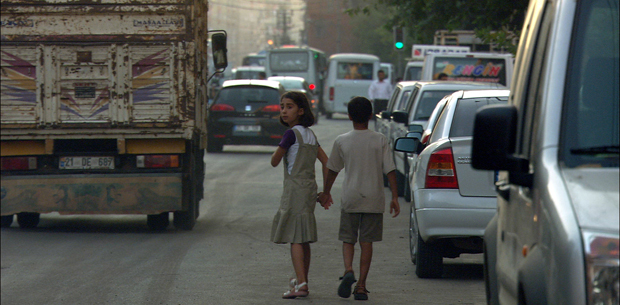Jano Rosebiani/Iraq/USA/2002/99min
Min Dit: The Children of Diyarbakir
Miraz Bezar/Germany/Turkey/2009/102min
When you think of foreign cinema, you probably don’t immediately think of the Middle East. We probably should start. If the films showcased at the Filmhouse’s Middle Eastern Film Festival are anything to go by, we will see a sharp rise in interesting political work coming from there in the near future. Focussing on Kurdish cinema, many of these movies explore the effects of conflict on civilians. Jano Rosebiani’s Jiyan and Miraz Bezar’s Min Dit focus on orphaned children finding their place in the world after the brutal death of their parents.
In 1988, Halabja was attacked with a poisonous gas which killed up to 5,000 and injured another 7-10,000. Saddam Hussein’s regime was held responsible for the massacre. Jiyan, made in 2002, depicts Kurdish-American architect Diyari (Kurdo Galali) as he returns to Halabja to build an orphanage for the surviving children of Halabja.
The film starts strong: powerful images of strewn bodies and burials are played in a montage, contrasting with the final image, and beginning of the story: a solitary girl on a swing looking lost. From there on, the pace is slow, but steady. Jiyan sets out to give viewers an emotional look at the aftermath of a genocide, and show that life can progress and repair. The sentiment is nice, it just fails to hold attention. It’s shown up by Bezar’s Min Dit, which doesn’t try too hard to be poignant, and is in parts funny.
The scope of the film ranges from before the children are orphaned to after – and perhaps that’s what connects us with the characters. After the murder of their parents, they live with their aunt. While attempting to arrange their emigration to Sweden, she mysteriously disappears and Gulistan (Senay Orak) and Firat (Muhammed Al) are forced to make their own way on the streets.
Where this film differs from Jiyan is that it doesn’t make any attempts to be gentle. And sensitivity might do well sometimes, but it doesn’t often provoke a great reaction. The economy aside, the Arab Spring is probably the most talked about piece of news in the last twelve months. Media in the UK doesn’t tend to show the harsh aftermath of such major events, but films like Jiyan and Min Dit will. It is important that we develop a relationship with Middle Eastern film; that we watch and understand it now, because it is going to have many more important things to say in the next few years.


Comments